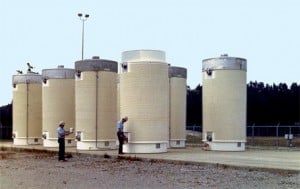 After Iran, arguably the most urgent problem in nuclear nonproliferation policy is Japan’s huge and growing stockpile of separated plutonium, its plans to start commercial reprocessing of spent nuclear fuels next year,* and the bad precedent that will set for South Korea, South Africa and other near-nuclear-weapons capable nations. Anybody concerned with this issue and how it might be addressed needs to read, right now, the op-ed in today’s New York Times by Frank von Hippel and Masafumi Takubo.
After Iran, arguably the most urgent problem in nuclear nonproliferation policy is Japan’s huge and growing stockpile of separated plutonium, its plans to start commercial reprocessing of spent nuclear fuels next year,* and the bad precedent that will set for South Korea, South Africa and other near-nuclear-weapons capable nations. Anybody concerned with this issue and how it might be addressed needs to read, right now, the op-ed in today’s New York Times by Frank von Hippel and Masafumi Takubo.
For decades von Hippel has been the world’s foremost and most influential critic of commercial spent fuel reprocessing–a bundle of related technologies, really, often dubbed “the plutonium economy–and I have nothing to add to the arguments he and Takubo make so ably.
I have reservations about just two points. First, von Hippel and Takubo emphasize the bad precedent Japanese reprocessing will set and downplay any scenario in which Japan might actually use its stockpiled plutonium itself to produce nuclear weapons. It’s true that Japan has had, since Hirsohima and Nagasaki, a considerable anti-nuclear phobia. But it’s also true that Japan has never really put itself through the kind of national soul-searching that West Germany underwent after the war. A network of conservatives cliques has remained firmly entrenched in power almost all the time, and within that network, there obviously have been nationalistic and militaristic elements that always have wanted to acquire nuclear weapons at first opportunity.
With nationalist tensions rising sharply among China, the Koreas and Japan, as economic rivalries also gather force, I feel that the danger of a Japanese atomic bomb cannot be dismissed out of hand.
Second, von Hippel and Takubo seem to suggest that it would be relatively easy to talk Japanese communities into accepting dry cask storage of spent fuels (see photograph), as an alternative to fuel reprocessing and plutonium recycling. (The general consensus among experts is, at present, that dry cask storage is a satisfactory and safe method of handling spent fuels in the medium term.) Von Hippel and Takubo think it ought to be possible to persuade Japanese communities to accept dry cask storage sites by bribing them, the same way they have been bribed to accept nuclear power plants. Post-Fukushima, that strikes me as a tad too optimistic–if optimistic is the right word.
It may take something more than bribery to talk Japan out of the dangerous course it is on: something like high-level personal diplomacy on the part of world leaders, and high-minded eloquence on the part of Japan’s own leaders.
____________________________________________________________________
* Throughout Japan’s postwar nuclear history, the country has been dead-set on commercial reprocessing spent fuels, a system in which plutonium recovered from the fuels would help power current-generation light water reactors and next-generation fast breeder reactors. Japan’s practice in recent decades has been to send its spent fuel to France and the UK for reprocessing; if its own commercial reprocessing plant comes into operation next year, it will have more autonomous control over how the plutonium is handled, and there will be much more separated plutonium in Japan.
The notion that reprocessing and recycling are essential to the future of the nuclear economy used to be the almost universally held common wisdom. In no small part because of the efforts by von Hippel and his colleagues, that notion has fallen into wide discredit. Difficulties with the technologies themselves have played an equal part. Breeder reactors have turned out to be highly accident-prone, and no country has built a viable commercial-scale reactor. Without breeders, the case for reprocessing and recycling fuels from conventional reactors is especially weak. What is more, reprocessing itself has had its share of mishaps; in the late 1990s, there was a serious accident at a Japanese prototype plant in which workers died.